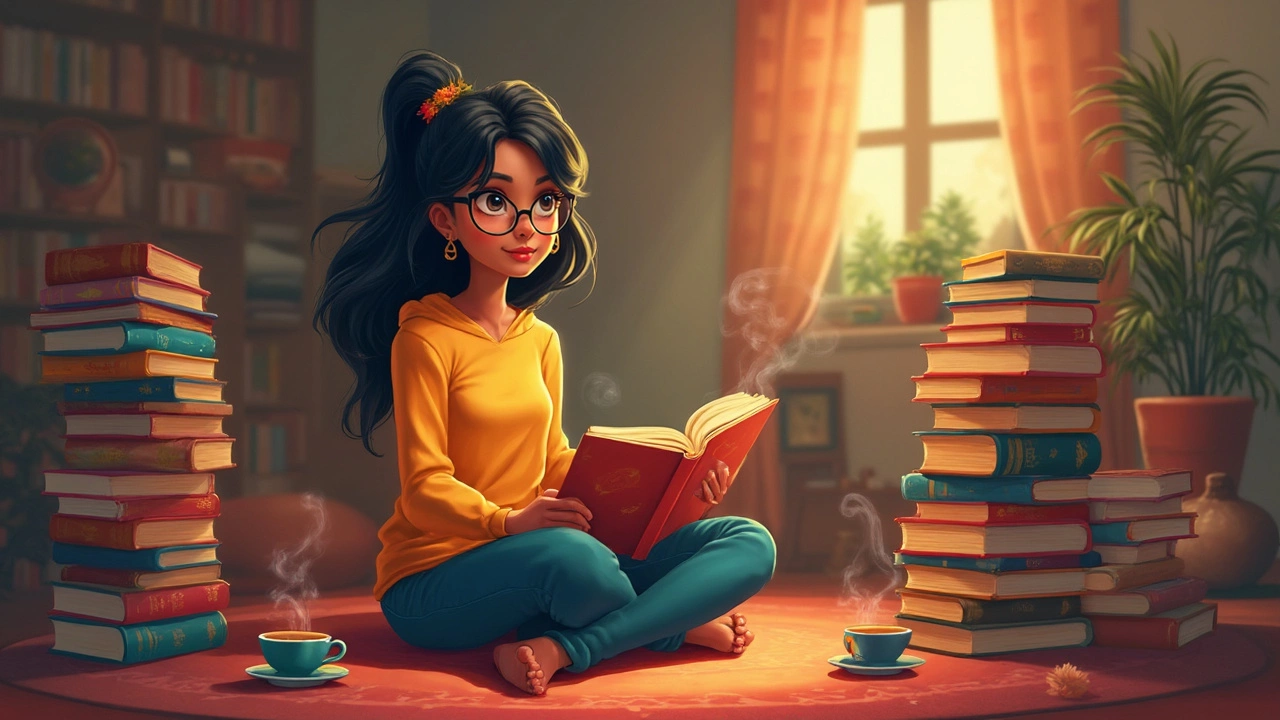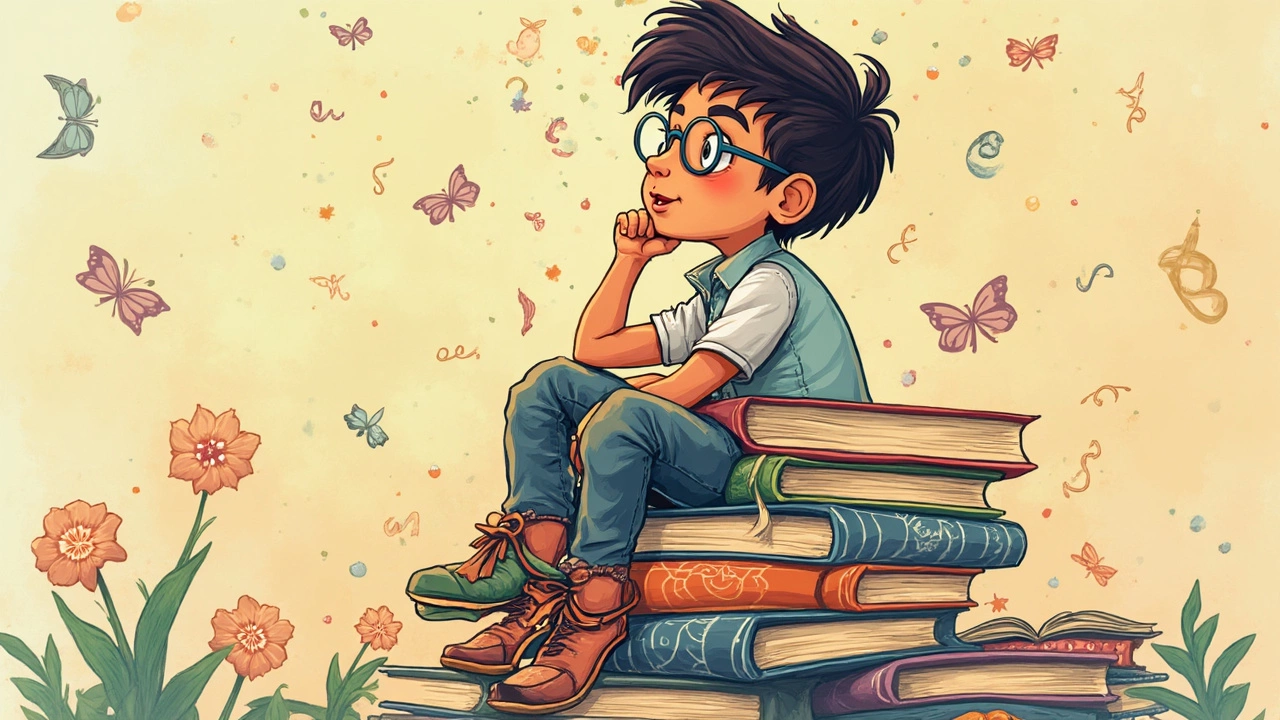What Is a Bibliophile? Exploring Book Lovers and Their World
 Jun, 28 2025
Jun, 28 2025
Ever caught someone reading in the oddest places and wondered if there’s a word for that kind of person? Think about it—someone curled up next to the washing machine with a worn-out paperback, or a fellow who reads e-books on the treadmill. There’s a whole vocabulary for these folks. But is being a big reader just about finishing stacks of novels? Or does it say something deeper about who you are?
The Many Names for Book Lovers
The English language has a knack for colorful labels. If you read a lot, you’ve probably been called a bookworm at some point. Weirdly, this term started off as an insult, nudging at those who supposedly spent all their time buried in books, ignoring the world around them. But ask any self-proclaimed bookworm, and it feels more like a badge of honor.
Yet, there’s a richer, fancier word that pops up in bookshops and online forums: bibliophile. That’s Greek for “book lover”—biblio meaning book, phile meaning lover. Bibliophiles don’t just love reading; a lot of them are obsessed with owning, collecting, smelling, and just being surrounded by books. There's another branch for extra-serious collectors: bibliomaniacs. That one’s not a compliment—it means you’ve crossed into the land of obsession, maybe blowing rent money on first editions.
See that kid in the corner of the schoolyard, nose buried in ‘Percy Jackson’ instead of playing soccer? Classic bookworm behavior. Or the grandma with fifty library cards; she’s a bona fide bibliophile. Some people even identify as logophiles—word lovers who go nuts over vocabulary in any form, not just books. And if you’re into rare, ancient, or beautifully bound tomes, there’s a title for you too: bibliophile-collector (yes, some folks take the term very seriously).
There’s even a term for someone who can’t stop buying books they’ll never read: ‘tsundoku’. This is Japanese, and I can personally relate—my nightstand is hazardous territory thanks to a mountain of books I might read… someday.
Don’t let the fancy terms intimidate you. Whether you call yourself a bookworm, bibliophile, or just a fan of a good story, you’re in good company. People have been obsessed with reading for centuries. France’s Queen Marguerite de Valois dragged a wagon full of books everywhere she traveled in the 1500s. Even Abraham Lincoln grew up borrowing books by candlelight and called them his “best companions.”
Here’s a fun fact for trivia night: the largest private book collection ever belonged to Sir Thomas Phillips—a British baronet who collected over 100,000 books in the 19th century. His house became so crowded he had to block off rooms, and his guests sometimes slept between stacks of manuscripts.
So if your friends joke about your “book problem,” just smile. You’re part of a tradition that stretches back thousands of years. And you’ve got the vocabulary to prove it.

The Benefits and Quirks of Extreme Reading
Why do people dive into books with such abandon? Science has plenty to say. A 2016 study from Yale University followed more than 3,600 adults over a dozen years. Their discovery? Readers who clocked just 30 minutes a day lived almost two years longer than non-readers. Let that sink in—just half an hour with a book can quite literally buy you more time on earth.
Researchers believe it’s not just about relaxing. Deep reading (not skimming social media) strengthens the brain’s imagination labs—the areas that process empathy, language, and reasoning. It’s like weightlifting for your mind. Regular readers score higher on vocabulary and writing tests and tend to keep their memory sharper into old age.
You’ll also notice quirks unique to big readers. Ever heard of “phantom bookshelf syndrome”? That's when you mentally arrange imaginary books on empty shelves—hoping you’ll one day fill the space with volumes you've been eyeing. Or those moments when you split your reading time between a hardcover, an eBook, and an audiobook? Welcome to the multitasking club. Some folks even track what they read obsessively, logging each title and rating them in notebooks or apps like Goodreads.
Let’s not forget the social side. Book clubs have exploded in popularity, especially since the pandemic. A 2023 Pew Research Center survey found nearly 25% of adults in the U.S. wanted to talk about books more often but didn’t have anyone in their everyday life who cared. Social media fixed that. Now, “bookstagrammers” and “BookTok” stars spark trends and viral challenges—hundreds of readers join in on group reads, debates, and quirky online reviews.
Kids pick up on this energy too. My daughter Keira once created a summer competition to see who could finish the most library books before Labor Day. Her friends soon joined in. Incentives help—chocolate chip cookies for each finished series worked like magic.
But let’s get real: sometimes, loving books is a bit awkward. You can’t always remember titles or authors in the moment, and there’s the classic struggle of lending someone a new favorite—then worrying you’ll never see it again. There’s also ‘book guilt’: a nagging feeling that you should be reading more, especially when a book stares at you from your bedside, judging you for choosing TV.
On the upside, studies confirm that reading fiction, in particular, ups your ability to understand other people’s feelings. Regular readers often nail emotional intelligence questions and show more open-mindedness to new ideas. Bookworms are also more likely to tackle tough topics, from history’s disasters to exploring new cultures, just for the fun of it.

So, You Want to Be the Person Who Reads a Lot?
If you’re aiming to wear the ‘bookworm’ or ‘bibliophile’ label with pride, start with some habits that make reading a key part of your day. Build a reading zone: find a comfy chair, good lighting, and a lack of distractions. I know a guy who turned his closet into a mini-reading nook—no windows, just a lamp and some pillows. It’s his “introvert recharge” spot.
Set easy daily goals. Even 10 pages a day adds up over time—heck, that’s over a dozen full-size books every year. If you’re swamped by the size of your reading pile, rotate between your interests: fiction for the feels, nonfiction for brain food, graphic novels when you want something quick and visual.
Treat yourself by mixing up formats. Don’t snub audiobooks—they count, too. Lots of busy parents listen to novels on the way to work or while prepping dinner. Story podcasts and radio plays tap into the same “deep reading” brain benefits if you’re into multitasking.
If your budget’s tight, libraries are absolute treasure chests. Don't just think of them as quiet places—most offer free digital downloads, e-reader loans, and even reading challenges for all ages. My local branch runs a “blind date with a book” program where you grab a mystery-wrapped title and discover something unexpected. Keira once unwrapped a sci-fi classic she’d never picked on her own and ended up loving it.
Not feeling motivated? That’s normal. Try pairing reading with habits you already love: five pages with your morning coffee, a chapter after dinner. Grab a book with short stories or essays for bite-sized wins. If you need a push, set up friendly competitions with friends or family—winner gets to pick a new book for the group.
If you want to stretch your horizons, dig into translated works. Learning about different cultures through their own voices beats any travel brochure. Online forums can connect you with readers worldwide who are eager to chat, swap recommendations, and encourage you to hit your next milestone.
One last thing: don’t stress about so-called “highbrow” or “lowbrow” reads. True bibliophiles devour everything from graphic novels to the latest bestsellers to encyclopedia entries about ancient volcanoes. It’s the reading habit that counts—the way stories and knowledge shape your view of the world, not whether you check off some literary canon.
So whether you see yourself as a die-hard bibliophile, a casual book lover, or just a weekend reader, those pages are your ticket to big ideas, better empathy, small joys, and, if those Yale scientists have it right, maybe even a longer ride on this planet. The label’s just the start—what you read (and who you become because of it) is the real story.